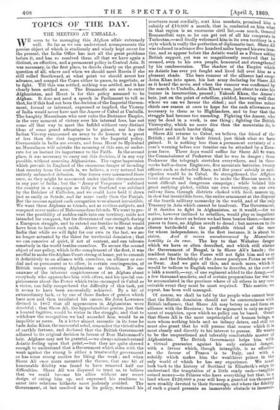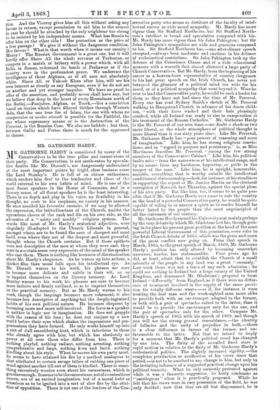TOPICS OF THE DAY.
THE MEETING AT UMBALLA.
WE seem to be managing this Afghan affair extremely well. So far as we can understand arrangements the precise object of which is studiously and wisely kept secret for the present, the India Office has met all the great problems before it, and has so resolved them all that we have again a distinct, an effective, and a permanent policy in Central Asia. It was necessary, in the first place, to decide clearly on the grand question of all, where and when we should meet Russia if she still rolled Southward, at what point we should arrest her advance, and compel the Czars either to pause, to negotiate, or to fight. Till this was settled, nothing was settled, and it has clearly been settled now. The Romanoffs are not to enter Afghanistan, and Herat is for this policy assumed to be Afghan. It does not need a speech in Parliament to tell us that, for if this had not been the decision of the Imperial Government, formal or informal, expressed or implied, the Viceroy of India would never have met the Ameer of Cabul at Umballa. The haughty Mussulman who now rules the Douranee Empire, in the very moment of victory over his internal foes, has not come all that way to meet the Infidel without very distinct ideas of some grand advantage to be gained, nor has the Indian Viceroy summoned an army to do honour to a guest of less than the first importance to the Imperial policy. Ceremonials in India are events, and from Herat to Hydrabad no Mussulman will mistake the meaning of this one, or underrate for an instant its importance to the Faith. In the second place, it was necessary to carry out this decision, if in any way possible, without annexing Afghanistan. The vague impression which prevails in England of the enormous danger of invading that country from the south is, we believe, a very natural but entirely unfounded delusion. Our forces were massacred there once, as they might be massacred under similar circumstances in any part of India ; but the "Army of Vengeance" subdued the country in a campaign as fully as Scotland was subdued by the Butcher of Culloden, and we could have held it down just as easily as Scinde, and far more easily than the Punjab. But the reasons against such occupation were almost irresistible. We want these Afghans as friends, not as restless subjects, and conquest never makes of Mahommedans friends. We want to prevent the possibility of sudden raids into our territory, raids not intended for conquest., but for diversions of our strength during a European struggle, and to extend our frontier to Herat would have been to invite such raids. Above all, we want to show India that while we will fight for our own to the last, we are no longer actuated by the thirst for territorial dominion ; that we can conceive of quiet, if not of content, and can tolerate somebody in the world besides ourselves. To secure the second object of our policy, which is the complement of the first, it was needful to make the Afghan Court strong at home, yet to commit it definitively to an alliance with ourselves, an alliance so cordial and so permanent as to allow, in certain contingencies, of British troops entering Afghanistan as friends. No one unaware of the inherent suspiciousness of an Afghan about everybody who approaches him with offers, and his special suspiciousness about the Power which twice encamped in Cabul as a victor, can fully comprehend the difficulty of this task, yet it seems to have been successfully achieved. By a bit of extraordinary luck, or by one of those flashes of genius which have now and then irradiated his career, Sir John Lawrence divined in 1867 that all appearances in Afghanistan were deceitful ; that Shere Ali, the hypochondriac genius, just then a hunted fugitive, would be victor in the struggle, and that to withdraw the recognition we had accorded him would be as impolitic as mean. In a letter almost sarcastic in its tone he bade Azim Khan, the successful rebel, remember the vicissitudes of earthly fortune, and declared that the British Government adhered to its original decision in favour of Dost Mahommed's heir. Afghans may not be grateful,—we always misunderstand Asiatic feeling upon that point,—but they are quite shrewd enough to understand that a Government which sides with the weak against the strong is either a trustworthy government or has some strong motive for liking the weak ; and when Shere All once more mounted the throne, that one bit of honourable fidelity was found to have removed half our difficulties. Shere Ali was disposed to trust us, to believe that we could become his allies without any secret design of eating him up, and expressed his readiness to enter into relations hitherto most jealously avoided. The Government, at last resolved as to its policy, welcomed his overtures most cordially, sent him muskets, promised him a subsidy of £10,000 a month, that is, conferred on him what in that region is an enormous civil list,—as much, Genera/ Romanoffski says, as he can get out of all his conquests in Turkestan,—and finally welcomed him in its own territory in a style which is really the perfection of diplomatic tact. Shere Au was induced to advance five hundred miles beyond his own frontier, and so appear before the Asiatic world as a Prince asking British support, yet was so magnificently received that he seemed, even to his own people, honoured and strengthened by his condescension. The shadow of the Empire which no Asiatic has ever yet fought and lived fell over him as a pleasant shade. The bare rumour of the alliance had swept Azim Khan into space, his last army declaring for Shere All as it heard the news, and when the rumour was confirmed by the march to Umballa, Azim Khan's son, just about to raise his banner in insurrection, paused ; Yakoob Khan, the Ameer's heir, just on the point of rebellion, yielded, knowing well that where we can we favour the eldest ; and the restless minor chiefs saw reason at once to hope for the cash allowances as necessary to them as to Highlanders, and to fear that the struggle had become too unending. Fighting the Ameer, who may be dead in a week, is one thing ; fighting the British Viceroyalty, which no more dies than the mountains do, is another and much harder thing.
Shere Ali returns to Cabul, we believe, the friend of the British ; and if he is their friend, just think what we have gained. It is nothing less than a permanent certainty of a year's warning before our frontier can be attacked by a European force. Three days would suffice for Shere Ali to warn the Commissioner of Peshawur that he was in danger ; from Peshawur the telegraph stretches everywhere, and in three weeks half-a-dozen Engineers, five mountain batteries, twenty officers such as defended Kars, and five years' subsidy in anticipation would be in Cabul. So strengthened, the Affghan force alone would be sufficient to make the Russian march a most difficult and dangerous campaign ; while behind this great outlying picket, within our own territory, on our own railway lines, through districts choked with food, masses up, in slow but irresistible force, the entire armament at the disposal of the fourth military monarchy in the world, and of the only Treasury in Asia which cannot be insolvent. The Government, if it decides to fight in Afghanistan, as it would,—for no native, however inclined to rebellion, would play so impatient a game as to desert us before we had been beaten there,—has no passes to force, no Afghan revolt to dread ; but moves on to its chosen battle-field as the profitable friend of the race for whose independence, in the first instance, it is about to strive. And it moves unembarrassed by Mussulman hostility in its rear. The key to that Wahabee danger which we have so often described, and which still alarms the Government of Bengal, is in Shere All's hands ; the maddest fanatic in the Passes will not fight him and us at once, and the friendship of the Ameer paralyzes Patna as well as Swat. And we gain all this, and much more, which it would be tedious to English readers to describe, at the cost of a lakh a month,—say, of one regiment added to the Army,—of a few thousand muskets, and of certain preparations for war to be accumulated in the province where of all others in any conceivable event they must be most required. This matter, we repeat, has been well managed.
Of course, we shall be told by the people who cannot bear that the British dominion should not be conterminous with British influence, that Shere Ali may betray us and form an alliance with the Russians ; but the argument is only an argument of suspicion, upon which no policy can be based. Grant that Shere All is the most unprincipled of human beings, a man whom nothing binds and no infamy deters, and still we must also grant that he will pursue that course which it is most clearly and directly to his interest to pursue. He wants to be the unquestioned and tolerably comfortable master. of Afghanistan. The British Government helps him with a virtual guarantee against his only external danger, with a favour which, though intangible, is as effective as the favour of France is to Italy, and with 3 subsidy which makes him the wealthiest prince in the only world of which he has any experience. We must look back to the history of Scotland in Elizabeth's nign to understand the temptation of a little ready cash coined money—to Princes who have everything but that, in a land where £120,000 a year will keep a guard of ten thousand men steadily devoted to their Sovereign, and where the fidehty of such a guard presents an immovable obstacle to insurrec
-tangible lion. And the Viceroy gives him all this without asking any favour in return, except permission to aid him to the utmost in case he should be attacked by the only neighbour too strong to be resisted by his independent means. What has Russia to offer him on the other side ? Her protection as the price of a free passage ? We give it without the dangerous condition. Her favour ? What is that worth when it means our enmity ? Money ? The Russian Government is a great one, but it will hardly offer Shere Ali the whole revenue of Turkestan, or compete in a match of bribery with a power which, with all India in flames, redeemed its bonds at Peshawur as if the country were in the profoundest peace. We underrate the intelligence of these Afghans, as of all men not absolutely white. Shere Ali. or Yakoob Khan after him, will see his own interest as clearly as any European, even if he do not act on another and yet stronger impulse. We have no proof to offer of the assertion, and probably never shall have any, but we believe that deep in the heart of every Mussulman north of the Sutlej,—Punjabee, Afghan, or Toork,—lies a conviction based on stories which have filtered thither through Western Asia, that the one true foe of Islam, the one with whom no compromise or modus vivendi is possible for the Faithful, the one whose supremacy means or is the destruction of the Crescent, is the Russian Czar. We also are Infidels ; but then, between Gallio and Festus there is much for the oppressed to choose.



































 Previous page
Previous page